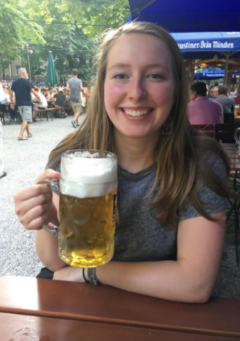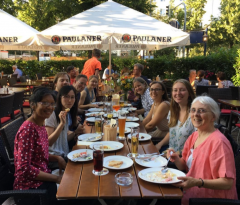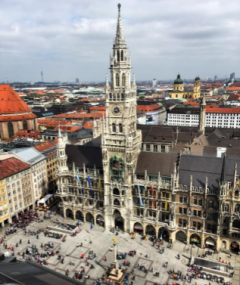
Having a bier at Augustiner Keller Biergarden. It is the most touristy bier garden in Bavaria.

Miranda Schreurs invited postdocs, PhD students, and some visiting professors from the USA to farewell dinner for me and the secretary to the department.

Central square (Marienplatz) in the city centre of Munich. Many historical monuments, events and traditions are located here.
My time in Munich was one of the most valuable internships I have ever had. I was able to work with academics in a field that I am passionate about: environment and climate change policy. I was also able to experience living abroad in Germany. The professor at my placement at the Technische Universität München (TUM), Miranda Schreurs, was a delightful, knowledgeable and generous advisor. My first week in Munich she invited me to a PhD colloquium in Berlin at the Freie Universität. This was my introduction to students that I would meet many times over the course of my two-month internship. These PhD students were able to help me with my master’s paper and provided valuable insight and different perspectives. Two of the PhD students kept in close contact with me throughout the two months and provided me with resources to further my research.
I attended four colloquiums during my time in Germany. These allowed me to learn more about the process that other students use for academic writing and gave me inspiration for my own Masters research paper. Professor Schreurs taught me that attending and participating in colloquiums is a great way to learn from your peers. By attending I was are given an opportunity to learn about new topics and discuss ideas and by participating I was able to receive criticism and gain new perspectives. I experienced this first hand by presenting at the last colloquium in Munich. I received feedback from the professors in attendance and new ideas by PhD students working on similar subjects. In Canada, master’s students do not have access to colloquiums and after my time in Munich I believe Canadian universities should adopt the practice.
I also had the pleasure of sitting in on several delegations visiting TUM and professor Schreurs. The first being two professors from Israel visiting to discuss their research in the fields of energy security in Israel. This topic was new to me and I appreciated learning about the issue and relating it to EU and Canadian energy security issues. Over the course of their week-long visit I was able ask them questions about their research. The second delegation from Korea came to the department to hear from professor Schreurs and her work on denuclearization in Germany, which has pledged to close all nuclear plants by 2022. Being able to sit in on this presentation gave me insight on the political choice made by Germany and how delegations can use professors to inspire policy change. This was useful for my personal knowledge and gave me insight into how academia influences politics. Professor Schreurs was a member of Chancellor Angela Merkel’s German Ethics Commission on a Safe Energy Supply, as well a member of the German Advisory Council on the Environment, and the European Environment and Sustainable Development Advisory Council. Having the opportunity to work with a professor who is so closely linked to German policy was an honour that taught me the value of academia in society.
Another valuable aspect of my internship occurred when Professor Schreurs gave me the opportunity to work on her “Green Dictionary” text that her PhD students have worked on in the past. It was my first time editing a manuscript that would be published. I enjoyed writing new entries and editing other entries to ensure that they were up to date and relevant. This task taught me to work on my time management skills and allowed me to research topics that were not in my usual field of study. I researched nuclear energy policy, historical events surrounding nuclear disasters including Chernobyl and Fukushima, and more. Along with this writing, I worked with a few postdocs in the department and gained experience with proposal writing for conferences and funding. This was a practical experience because proposal writing is a skill I struggled with prior to working with the postdocs. Now I understand the language used in proposals and how to tailor it to different organizations. The postdocs were specifically applying for funding from TUM and a partner Japanese university, as well as applying for a conference in Poland.
Interning at TUM with professor Miranda Schreurs gave me an exciting and unforgettable summer. Learning about environment and climate change policy in Europe and Germany was an experience I will cherish forever. I gained knowledge in new fields of policy, while learning practical skills that I can apply to my graduate degree in Canada and in my future career. I would recommend this internship to any student who is excited by policy and would like to explore Europe!